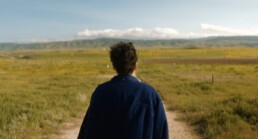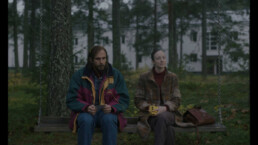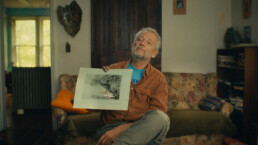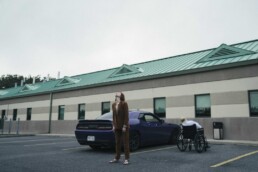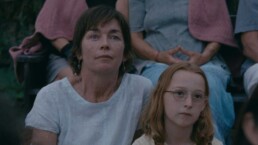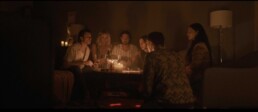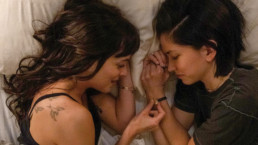'Anywhere the Wind Blows' Review: A Second Chance at Life & Love
Jay Liu draws inspiration from his community to tell the story of an exiled, young political refugee in his directorial debut, Anywhere the Wind Blows. The writer/director, who is of Hong Kong descent and living in the United States, delicately weaves themes of oppression, queerness, and heartfelt dilemmas into the neatly packaged 18-minute short film. Anywhere the Wind Blows is a timely film that reflects the current political environment we all find ourselves in today. Using a visual medium to make a statement, Jay Liu gives audiences another perspective on the effects of political persecution.
Fleeing Hong Kong for Los Angeles
Images of frontline political conflict in Hong Kong flood Alex's (Glen Wong) mind as he walks down a busy street in Los Angeles. Hong Kong is constantly in the political activist's thoughts ever since he moved to the United States from Hong Kong two years ago to avoid political persecution. His relocation was sudden and, despite success at rebuilding his life in a new city, Alex can't help but still feel like a sense of closure is missing.
On this particular day, Alex has plans to reunite with his ex-boyfriend (Ray Kam) from Hong Kong who happened to be in town on a business trip. Two years since their breakup and Alex's move across the globe, their initial meeting is, understandably, a bit awkward. However, after a couple of vodka martinis, Alex wonders if it's possible to rewrite the past and start anew. But even if it was possible, does he dare settle for the comfort of his familiar past, or should he follow his instincts and push forward toward an uncertain yet hopeful future?
Rich Visual Storytelling
Anywhere the Wind Blows offers audiences a rich cinematic aesthetic with its strong color grade and confident cinematography. The film really comes alive during its more theatrical moments, such as the dance club that transforms into a street protest. The dreamlike sequence plays with a trancelike fluidity and feels wise beyond its years. All around, from story to execution, Anywhere the Wind Blows is an impressive output.
Takeaway
One of the film's most powerful takeaways is the graceful acceptance of second chances. Alex initially made a rushed decision to leave Hong Kong out of fear. Now, staring his ex-boyfriend in the face, Alex is confident enough to make future decisions from a place of strength. It's a good reminder that it's never too late to follow your intuition, no matter the situation.
Anywhere the Wind Blows is produced through the USC School of Cinematic Arts. The film was selected to screen at this year's American Pavilion Emerging Filmmaker Showcase at the 2024 Cannes Film Festival.
'What Remains' Review: The Harrowing Story of Sweden's Most Notorious Serial Killer
Inspired by true events, What Remains tells the harrowing story of a mentally ill Scandinavian man who confessed to, and was convicted of, more than 30 murders of young boys. Based on the life of Sweden's most notorious serial killer Thomas Quick, filmmaker Ran Huang avoids turning this emotionally fraught story into a showy spectacle. It can be argued that the true crime genre, as a whole, has become "Netflix-ified," catering to audiences who crave easily digestible, pop culture content over the more mundane reality of police investigations. What Remains is not an easy watch in any sense. It is dark, voyeuristic, and devastating. It is also an interesting meditative study of the effect trauma has on memory, and how the body keeps the score.
An Unsolved Disappearance Threatens a Massive Unraveling
Mads Lake (Gustaf Skarsgård) has been held in a Scandinavian psychiatric hospital for years after being convicted of molesting multiple young boys. Recently, though, his chance to start over and rejoin society is actually within reach. The thought both excites and terrifies him. Mads currently exists in the world as a shell of a human. He has hollow eyes and a shaky voice that barely registers above a whisper. His long, stringy hair and unkempt appearance show obvious signs of depression and defeat. His look is the epitome of a guilty man.
This is also the impression he gives his therapist Anna Rudebeck (Academy Award-nominated Andrea Riseborough) upon their first meeting. However, she can see through Mads' physical appearance as she gently digs into his past in search of the canon event that altered his life. It's not long before she discovers that Mads was sexually abused as a child by his father. Hearing this, Anna stays neutral and non-judgemental, offering patience and grace. However, Officer Soren Rank (Stellan Skarsgård) has a less lenient approach. His only goal is to get to the truth of the unsolved disappearance of a six-year-old boy that Mads may have been involved in.
Anna and Soren's opposing viewpoints sometimes lead to tense conversations, which only makes Mads' memory murky. Did he kill this boy, and the others he abused? At first, Mads is adamant he had nothing to do with this boy's disappearance. But as evidence is produced that seems to claim otherwise, Mads begins to question everything he thought he knew about himself.
A Skarsgård Family Affair
What Remains is a bold directorial debut for Ran Huang, whose only previous credit includes the 2014 short The Administration of Glory. Most notable is the deliberately slow pacing, almost leaning into director Apichatpong Weerasethakul's territory. For a high-intensity, high-stakes thriller, Ran Huang unfolds the narrative beats in What Remains with almost too much restraint. Running two hours and six minutes, a tighter edit could have offered a stronger thrill component to the story. As it currently plays, the abundance of silence dilutes the tension.
The darkness of the subject matter equally matches the film's visual aesthetic. The score, composed by Ben Frost, includes limited cues. But when the intensity of the music starts to creep in, it effectively shifts the whole mood. It's also worth pointing out that What Remains is a family affair for Sweden's royal family, the Skarsgårds. Not only does Stellan and his son Gustaf star in the film but Megan Everett-Skarsgard (Stellan's second wife and Gustaf's stepmother) co-wrote the screenplay.
Takeaway
Again, What Remains is not an easy watch, but it does offer a fascinating look at procedural psychology in action. The performances are steadfast and strong, which is to be expected with the Skarsgård family. Its darkness may be a tough sell but if you're interested in a unique approach to the overdone serial killer story, What Remains may be for you.
'A Two Hearted Tale' Review: The Craft Beer Revolution is Coming and it Starts With the Label
When discussing craft beer, most of the time the conversation centers around the taste and quality of the beverage. In co-directors Bret Miller and Rory McHarg's short documentary A Two Hearted Tale, they ponder a more philosophical question: What makes a good beer label? The answer, they come to, is escapism. Featuring Ladislav Hanka, the eccentric artist behind Bell's Brewery's famous label the "Two Hearted Ale", for which the documentary's name is inspired, A Two Hearted Tale explores how beer can be more than just an adult beverage but a fascinating story.
Dave Chappell famously asked for a Bell's Beer during a comedy set and pointed out its unusual label. “Why the hell did you put a fish on the label?”, he exclaimed aloud to much laughter from the crowd. It is a good question, why a fish? For the answer, the label's artist Ladislav Hanka goes into colorful detail about his storied career in animation and the early lessons from childhood that shape his art today. He also speaks to drawing–pun intended– inspiration from John Voelker, author of Trout Madness and Anatomy of a Murder, a former Supreme Court Justice who quit his job in order to live a simpler life. A running theme in his work centers around the simplicity of life, a vibe that Bell's Brewery and their signature beer label, the "Two Hearted Ale", want to align with.
Watch A Two Hearted Tale trailer here.
A Fascinating Peek into the Advertising Industry
Bell's Brewery is considered the pioneer of commissioning artists to create labels for their bottles. Unlike traditional beers like Coors or Budweiser, the "Two Hearted Ale" takes the drinker on a journey. Additional interviews with craft beer connoisseurs go into further detail about the history of the label and their plans for the future of Bell's Brewery.
A Two Hearted Tale has an edgy, contemporary feel to it, almost playing more like a piece of branded content than a traditional film. It is engaging from start to finish, both visually and narratively. Due to the abundant and intricate discussions surrounding the themes of art and design, A Two Hearted Tale also offers a fascinating peek into the advertising industry.
Takeaway
Made with compassion and genuine curiosity for the art of design, A Two Hearted Tale is a wonderful story about discovery and self-actualization. This is the start of the craft beer revolution, and Bell's Brewery is leading the charge by showing the world what a beer label is capable of.
'Kinds of Kindness' Review: A Twisted Anthology of Artful Mayhem
Despite its weird and oftentimes head-scratching moments, one thing is clear: Kinds of Kindness is made by a man who absolutely loves cinema. Yorgos Lanthimos, director of my favorite film The Lobster–as well as Academy Award-winning Poor Things and The Favourite–cooks up a smorgasbord of eccentricity and kookiness in his latest work, Kinds of Kindness. It does have a lengthy runtime of 2 hours and 45 minutes but the film surprisingly breezes by with uncompromising energy. Kinds of Kindness is a film you may not completely understand, but it's surely one you will not forget.
The Less You Know, The Better
Like a gothic Wes Anderson anthology on ketamine, Kinds of Kindness is a very different movie for Lanthimos. Instead of following a traditional narrative structure, the film is broken up into three distinct short films that seem to have no correlation to each other. The cast includes Emma Stone, Jesse Plemons, Willem Dafoe, Margaret Qualley, Hong Chau, Mamoudou Athie, and Joe Alwyn (with a brief appearance by Hunter Schafer). The actors appear in each film but play different characters, completely unrelated to each other. It's quite engaging and often hilarious, much like how the cast of SNL fluidly jumps in and out of different scenes and personas.
The first in the anthology, "The Death of R.M.F.," tells the story of a wayward man (Plemons) who struggles to regain control of his life, ultimately facing the mercy of his unsympathetic boss (DaFoe). In the second film, "R.M.F. is Flying", a police officer (Plemons) is reunited with his wife (Stone) but questions whether the woman really is who she claims to be. The third film, "R.M.F. Eats a Sandwich", stars Plemons and Stone again, this time as brainwashed cult followers who are on a mission to find the next spiritual prodigy. Of all three films, the second one stands out as most in line with Lanthimos' earlier Greek "weird wave" classics. Emma Stone's physical comedy shines here, proving that her partnership with Yorgos Lanthimos continues to strike gold.
Despite the seemingly incompatible narratives, some common themes and symbols are present. The purpose of dreams, fragility of identity, sexual exploration, and vulnerability in the form of walking barefoot appear in various ways throughout the film.
Riding the Greek Weird Wave
Lanthimos and co-screenwriter Efthimis Filippou re-team with many familiar faces from their recent Oscar-winning Poor Things (I can't imagine how everyone had time to make this movie in between production and awards campaigning!). In addition to Emma Stone and Willem Dafoe, he notably enlists cinematographer Robbie Ryan, editor Yorgos Mavropsaridis, composer Jerskin Fendrix, and sound designer Johnnie Burn to help bring Kinds of Kindness to aesthetic perfection. It's worth pointing out that, unlike the sonically flamboyant score in Poor Things, Jerskin Fendrix takes a much more restrained approach here. All three films embody the same off-key, eerie piano melody, akin to if your cat started walking across a keyboard.
Yorgos Lanthimos' love affair with the craft is on full display, enough to make every cinephile giddy with excitement. There is enough of his classic styling, like signature angular framing and intense closeups, to allow fans to find comfort in the familiarity and just enough disruption to push boundaries. All that to say, Kinds of Kindness isn't exactly an "enjoyable" movie to watch, rather, it's wholly fascinating. The distinction here is specific; it's not a film I'm rushing to rewatch soon but that might be because I still can't stop thinking about it.
It's worth sharing a quote from Yorgos that opens the press notes: "Sometimes you just need to be ridiculous in order to achieve what we're trying to achieve."
Takeaway
If you take away anything from my review, let it be this: It is a long movie but don't make the mistake of leaving before the credits! While I admit that the surprise final scene didn't answer all of my lingering questions about how everything ties together, it did offer a very crucial nugget of information that made me nod my head in appreciation of the long game that Lanthimos plays all throughout Kinds of Kindness. Checkmate, Yorgos.
'Janet Planet' Review: A Charming Meditation on Mother (and Child) hood
Julianne Nicholson is one of those actors who, anytime you see her name in the credits, you can trust that you're likely to witness a truly great film. Janet Planet, the impressive feature debut from writer/director Annie Baker, doesn't just meet this expectation, it surpasses it. Distributed by A24, Janet Planet is a tenderly told, slice-of-life film about a middle-aged single woman and her inquisitive 11-year-old daughter who show up for each other in different ways.
Summertime and the Living's Easy
It's the summer of 1991 in rural America. Western Massachusetts to be exact. Janet (Julianne Nicholson) and her boyfriend of the moment have just picked up her daughter Lacy (Zoe Ziegler) from summer camp, weeks earlier than intended. Lacy is a self-aware, quiet kid who–anticipating that she wouldn't make friends quickly enough–drastically calls home in an attempt to avoid the embarrassment of summer camp isolation. On their way back to the family home, Lacy stares out of the backseat car window. The warm breeze blows down the highway while the radio plays a distinguishable tune. Lacy feels settled once again, knowing she is back with her mom for the rest of the summer.
The summer months play out onscreen through various relationships Janet engages in, both romantic as well as friendships. When three visitors enter Janet's orbit, and by proxy Lacy's as well, they bring out different sides of the mother/daughter duo. The way each person affects Janet and Lacy is captured with slow and steady precision. Janet camouflages into a caretaker, a lovesick romantic, and a loyal disciple depending on who she spends her time with. It becomes clear that despite lacking unwavering confidence, Janet is always just trying to do what she thinks is right. Lacy is reactionary to her mother's personality shifts, as any child would be. By the end of the summer, Lacy realizes that she is morphing into her own unique existence, independent of her mother's adult world.
The Organic World and Sound of Janet Planet
Encapsulated in warmth and earnestness, the film's best moments come as we observe Lacy letting her imagination run wild. Interpreting the world through her eyes as she attends hippie dance performances and eavesdrops on grown-up conversations, Lacy's childlike wonder and unassuming naivety hit the right sweet notes. I have a feeling Lacy and Olive from Little Miss Sunshine would have become best friends forever.
Contrary to the assumption, Janet Planet moreso follows the character development of Lacy than Janet. However, it's Julianne Nicholson who anchors the film with her quietly commanding presence. She can tell a full story through facial expressions alone. Her charisma and authenticity ring true with fierce tenacity.
The world of Janet Planet is unlike anything I've seen this year. Baker's vision for an organic, immersive experience is almost trancelike in its ability to transport audiences into the scene. Notable factors include the production design of their house in the woods, overseen by production designer Teresa Mastropierro, art director Thomas Slattery, and set designer Danica Chipman. Forgoing a traditional score in favor of mostly diegetic sounds and field recordings, the sound of Janet Planet reflects the loneliness and purity of the central characters. It's a genius choice, helmed by sound designer Paul Hsu, that tips the film into greatness.
Takeaway
Janet Planet is a deliberately slow-paced film about evolving into one's own person. The mother/daughter bond is sacred for so many, the process of finding individuality within this relationship is a universal experience. Through beautiful performances, a sensitive script, and breathtaking design, director Annie Baker crafts one of the most tender and unifying films of the summer-yet alone, the year.
'Stupid Games' Review: Love is a Losing Game in This Indie Horror
"Play stupid games, win stupid prizes" is a phrase often used as a warning that one should heed as cautionary. Co-directors Nicolas Wendl and Dani Abraham embody this infamous adage by creating cinematic suspense in the indie horror, Stupid Games. Equal parts psychological thriller and paranormal fright film, Stupid Games is a modest yet highly executed feature that thrives off of its tight-knit cast, well-balanced screenplay, and smart use of light and shadow.
Dinner Party From Hell
It's late one night as two friends, Jaxon (Saad Rolando) and Rex (Gage Robinson), make their way over to Celeste's (Alyssa Tortomasi) apartment, Jaxon's on-again, off-again hookup buddy. Jaxon and Celeste's relationship recently went through a rough patch after she ghosted him for weeks but now she seemingly wants to make amends by inviting him and his friends over for a dinner party. Celeste is adamant that Jaxon bring two, and only two, friends with him to balance the ratio for her two roommates. When the third friend cancels en route to the party, Jaxon and Rex get desperate. Not wanting to break their promise to the girls, the guys recruit Stanley (Grant Terzakis), a man they find in the apartment building, to accompany them to the dinner party.
Once the guys arrive, Celeste, her roommate Riley (Cass Huckabay), and their friend Mia (Ashwini Ganpule) greet them. The night starts innocent enough with couples pairing off organically. Just as the group gets into lively conversation over glasses of wine, the apartment loses power. The girls assure the guys that this happens frequently and suggest they stop dinner and play board games by candlelight until the electricity turns back on.
Darkness Brings The Demons
They settle on a game that seems innocent enough. However, the guys quickly start to notice strange, unexplainable glimpses of paranormal activity throughout the apartment. Then–like a record scratch–the girls' facade suddenly strips away, uncovering their ulterior motives as the night descends into madness and witchcraft. The only way to end the chaos and break the spell is to finish the game but the question of who will make it out alive remains to be seen.
Stupid Games, written by Tanner Adams, takes place predominantly in a single location over the course of one night. This intimate setting further adds to the foreboding claustrophobia of the evening's events. The composer behind the evocative and eerie score, Darren Wonnacott, crafts heightened tension, especially during the board game scene. The film's theme, a minor-note simple melody, is darkly unsettling and completely enjoyable. Cinematographer Christian Klein uses the film's themes of darkness to his advantage as he incorporates beautiful shadow work into nearly every scene. The orange hue from the street lamps to the wax candles surrounding the interior of the apartment clearly sets the tone that audiences are in for a nighttime nightmare.
Takeaway
Similar to classics like Jumanji and Practical Magic, Stupid Games shows how evil can lurk in unexpected places. It also stands as a cautionary tale to think twice before agreeing to participate in any stupid games, or a stupid prize may be the least of your worries.
'Rebel Country' Tribeca Review: Exploring Country Music's Evolution
From Lindsay Ell to Lil Nas X, country music has gone through one incredible makeover in recent years. The long-held stereotype that the genre has previously faced of being racist, bigoted, and politically right-leaning seems to, thankfully, now be a thing of the past. It's safe to say that the tides started changing in 2019 when Lil Nas X burst onto the scene with his hit Old Town Road. Who could have guessed that a queer, black rapper would have dominated the charts and changed the trajectory of country music forever? In Rebel Country, directed by Francis Whately (David Bowie: Five Years, Dolly Parton: Here I Am), a handful of culture changers and country music artists set the record straight on the exciting state of the genre today.
Music for the Outcasts
Country music has always been a home for the outcasts, the rebels, and those who challenge the status quo. It is an outlet for creative storytelling through heartfelt lyrics and catchy chord progressions. Following in the footsteps of legendary crooner Johnny Cash, Rebel Country opens with CMT Music Award-winning musician Jelly Roll performing Folsom Prison Blues to a crowd of inmates in the prison where he used to be incarcerated. Going from criminal to celebrity is a humbling and hopeful trajectory that Jelly Roll reiterates, through his music, is possible. Not fitting into the mold is almost a requirement to be a successful country star. This sentiment is echoed by Jelly Roll, along with Blanco Brown, Breland, Lainey Wilson, Sam Williams, Lindsay Ell, and more as they share their stories of finding refuge in the country music community.
Whose Country is It?
There is no doubt that country music is far more diverse today than ever. However, that doesn't mean that the genre is free from criticism. An obvious example that the documentary explains in depth is Lil Nas X's debut Old Town Road, and how it was rescinded from appearing on the Country Billboard chart due to not being "country enough." Lil Nas X opened Pandora's box, showing that the future of country music didn't have to revolve around heterosexual, midwestern white men and women. His presence on the scene allowed Black and Mexican-American artists like Breland and Frank Ray to finally see themselves reflected in the community and feel confident pursuing their own musical ambitions.
Takeaway
Despite its progression, Rebel Country is quick to confirm that the genre's target audience is still the same. Country music still is–and always will be–music for the outsiders and misfits. After watching Rebel Country, which recently premiered in the Spotlight+ competition of the Tribeca Film Festival, it's easy to see why many believe country music is the future.
'AM I OK?' Review: Dakota Johnson Explores Her Sexuality
It's a full-circle moment for Tig Notaro and Stephanie Allynne. The real-life couple, who first met on the set of the 2013 Sundance selection In a World... return to the festival as evolved women: now married, and bringing their directorial feature debut, AM I OK?, with them.
Even if you aren't familiar with stand-up comic Tig Notaro & actor Stephanie's real-life love story, you'll find there is a lot to admire in their new film. Born out of the duo's personal vulnerabilities around self-discovery and acceptance, it's their authentic point of view that makes AM I OK? a satisfying film debut. Although a little simply conceived, AM I OK? is a tender and tonally-confidant first feature.
Finding Yourself at 32
Lucy (Dakota Johnson) and Jane (Sonoya Mizuno) are best friends. No one understands each others' lunch orders or inside jokes better than they do. The earliest hint of a strain in their relationship comes when Jane tells Lucy some unexpected news: her company has given her relocation orders and she'll be moving from Los Angeles to London in a few months.
Lucy is taken aback; she tries her best to be happy for her friend but deep down, she's terrified that their relationship will change forever. With time now ticking against them, Lucy also musters up the courage to share something she's never admitted before: she's gay.
Equally taken aback by this confession, Jane swiftly makes it her mission to help Lucy feel confident exploring her sexuality before she leaves for London. But Lucy is a bottle of anxiety, which causes her to overthink every interaction with her cute co-worker Brittany (Kiersey Clemons). Lucy is angry, frustrated, and sad. How, at 32 years old, is she just admitting this out loud now, she bemoans. Lucy's insecurities eventually take their toll on Jane, which causes a rift between the girls as the London countdown looms closer. The film ends on a slightly predictable note but the heartwarming sentiment is more than enough to have us invested up until the very end.
Shoutout to Silverlake
Sundance darling Dakota Johnson embodies the conflicted Lucy with such grace, that it's impossible not to sympathize with her struggles. Her typically quiet demeanor is stretched in unfamiliar ways, as we see her weeping in bathroom stalls and having explosive public arguments. Dakota proves that she can hit any note on the emotional spectrum. Sonoya Mizuno plays Jane with such loyalty and tough love, that we'd all be lucky to have a best friend like her.
Stylistically, notable moments include the spot-on soundtrack curated by music supervisors Randall Poster and Meghan Currier. Phoebe Bridgers' Motion Sickness and ROE's Etc Etc fit like missing puzzle pieces in its script. (It's also incredible to see many scenes take place at my favorite LA bar/restaurant, Edendale!)
Takeaway
AM I OK? is a love story about female friendship and the strength it takes to be honest with yourself. As Lucy learns through her highs and lows of self-discovery, fear shouldn't dictate the choices you make. Yes, it's scary to face rejection or disappointment but it's even more terrifying to look back on life and realize you've missed out on what you truly wanted.
This review originally ran on January 25, 2022 during the Sundance Film Festival.

